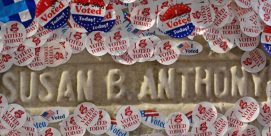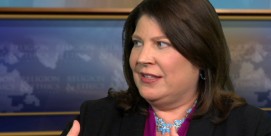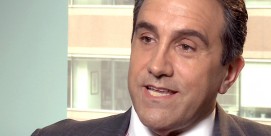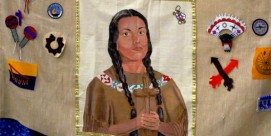Look Ahead to 2008
FRED DE SAM LAZARO, guest anchor: And now, as 2007 comes to a close, we convened a panel of journalists to discuss what we can anticipate in religion news for the year ahead. Bob Abernethy sat down with our guests.
BOB ABERNETHY: We take our annual look ahead today at the stories we think will be worth watching for in 2008.
Rachel Zoll covers religion for the Associated Press. David Gibson joins us from New York. He writes frequently about the Catholic Church. His latest book is “The Rule of Benedict.” And E.J. Dionne is a columnist with The Washington Post, a senior fellow at the Brookings Institution and a professor at Georgetown University. Welcome to you all.
E.J., the voting begins in Iowa this coming Thursday (January 3). Talk about religion’s role in this campaign so far.
E.J. DIONNE (Columnist, The Washington Post, Senior Fellow, Brookings Institution and
Professor, Georgetown University): Well, you know, the Iowa voting in particular, but the Republican side has been saturated with religion, and I think religion will continue to play a big role. First, you have Mitt Romney, who would be, if he were elected, the first Mormon president of the United States, had to give a big speech about this in an effort to push back what some thought was a certain amount of prejudice against Mormons. And then you’ve got Mike Huckabee who is an ordained Baptist minister and who has seemed to rally enormous amounts of evangelical support in Iowa. It was said the evangelicals didn’t have a candidate this year. Well, actually they were looking for a candidate, and they finally a lot of them settled on one of their own against the wishes of some of their national leadership. Now on the Democratic side religion has not played a central role, but both Barack Obama and Hillary Clinton, and to some degree John Edwards, are very fluent in talking about religion. So I think they will be heard on this subject as the campaign goes on.
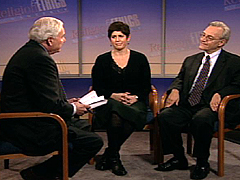 |
RACHEL ZOLL (Religion Writer, Associated Press): The question is, is religion going to be as much of a factor in the way people vote? It seems that the war on terror has actually become something that’s a little bit more important for some of the religious folks. When you look at Pat Robertson’s endorsement of Giuliani, which was such a surprise to people, that was based on his opposition and concerns about the war on terrorism, and that’s always been the case with the religious right, where it’s a mix of a conservative theological view with a conservative political view, when in the Cold War it was Communism, and now it’s the war on terror.
Mr. DIONNE: What’s fascinating is he doesn’t — Pat Robertson — does not seem to have delivered yet a lot of evangelical support to Rudy Giuliani, and a lot of evangelicals on the ground, especially in Iowa, have rallied to Huckabee.
ABERNETHY: We’ll come back to this, but David, one of the things that’s going to happen this coming year is that the pope is coming to New York and Washington. What do you expect his messages to be?
DAVID GIBSON (Journalist and Author, THE RULE OF BENEDICT): Well, there’re going to be two elements to this papal visit as there are, I guess, to every papal visit: the pastoral and the political. Pope Benedict XVI will be arriving in April 2008, three years almost to the day after his election. He’ll be celebrating his 81st birthday. This may be the only time that Americans get to view him up close and personal, and they want to kind of see what sort of man he is. They just know him still really as Cardinal Ratzinger, his old incarnation, so they kind of want to take the measure of Pope Benedict XVI. Of course, it’s also going to have a political impact. The visit is billed not just as a pastoral visit to New York and Washington, but also a visit to the United Nations General Assembly. What will he say? What will his topics be? How much will he play up his environmentalism, which has really become a fascinating aspect of this papacy?
Ms. ZOLL: One of the biggest challenges also for this visit is that it’s happening during a presidential election year, and if you talk to some of the leaders in the Church, and I know David probably knows more about this than I do, but they’re concerned that the pope’s visit will somehow be co-opted and pulled into presidential politics in a way that the Church does not want it to be.
ABERNETHY: What about that, David?
Mr. GIBSON: Well, I think that’s a really interesting point, and a lot is going to depend, again, on these caucuses and on these primaries, and where we’re at with the candidates in the election. If Rudy Giuliani is the presumptive nominee at that point, it’s really going to put Catholicism in the spotlight. If it’s somebody else, that whole issue of the “wafer wars” — the Communion battles that we had in 2004 — may be a little more, you know, out of the spotlight. But it’s going to be a really fascinating time — a difficult and delicate time for the pope to come here because he’s also, again, at the United Nations, but also in the nation’s capital.
Mr. DIONNE: I think every word the pope says is going to be parsed politically, which could be unfortunate in certain ways. This is a pope whose first two encyclicals were on love and hope, and I hope we hear about love and hope. But, you know, the Catholics themselves are torn between Catholics who want the Church to focus on a very particular list of non-negotiable issues, they call them, particularly abortion and the right to life. Generally, a lot of other Catholics want a broader agenda that includes social justice, coming straight out of Catholic social teaching. This pope is not at all hostile to the social justice agenda, but people are going to be parsing what he says and looking for support for one side or the other in that argument.
Mr. GIBSON: I think it’s also going to be interesting, Bob if I might add, what he doesn’t say. Church officials in Boston were pressing very hard for Pope Benedict to make a stop — just even one day in Boston — to address the, again, this ongoing impact of the sexual abuse crisis that really mushroomed out of Boston. and Benedict and Vatican officials opted not to do that. He’ll just instead go to Washington and New York, where he’ll celebrate Mass at Yankee Stadium. You might say that Boston got the World
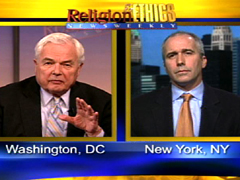 |
Series, but the Yankees get the pope.
ABERNETHY: One of the things that will certainly be going on in the New Year is more and more of something that we’ve already seen, which is this closer relationship between religious organizations in the United States and those in other countries. Rachel, you’ve been writing a lot about this.
Ms. ZOLL: The growth or explosion, really, of Christianity overseas is having an impact within the United States. As just one example, the United Methodist Church, which is considered and is and always has been very much of a middle class American church, if the current growth trends continue will become a majority African church within the next couple of decades. They’re already dealing with the fact that there are Methodists from the Philippines and from Korea who are planting churches within the United States as well, and they’re trying to figure out the relationship there. Another impact of it is that a lot of very entrepreneurial, very evangelical-minded or evangelically minded African pastors are coming over here to plant churches in the United States. Now, for people who don’t watch these things closely, they are puzzled. Why does, in a very religious country, does anyone need to plant more churches? But these are very fervent believers, and they think that the American church has lost its spirit and has become co-opted so much by the culture that they’re here to save us.
ABERNETHY: Meanwhile, some U.S. Episcopalians are separating themselves from the main Episcopal Church and putting themselves under the authority of Nigerians or others in Africa or South America. Bring us up to date on that.
Ms. ZOLL: Sure. The Christians overseas tend to have a very theologically conservative view on the moral issues that we’re grappling with here, and what’s happening is that theological conservatives in the United States are making common cause with like-minded conservatives overseas. The Episcopal Church is not cracking up. It’s a very small comparative number of churches that have actually left the Episcopal Church, about 55 as of this date out of more than 7,000 congregations in the United States. But it’s not just the numbers. It’s the — a lot of those churches are some of the most vibrant churches within the Episcopal Church, and just recently an entire diocese voted to leave.
ABERNETHY: But do you expect more of that separating?
Ms. ZOLL: It’s not clear how many more will happen, but what we know that what will happen next year is a lot of litigation, and that is going to be very difficult for the Episcopal Church and for people who are trying to leave. It’s going to be expensive. It’s going to be ugly, and it’s going to take a long time to play out.
ABERNETHY: David Gibson, more on this globalization thing. There are going to be talks, I think, between the pope and Muslim leaders in response to Muslim requests for that. What do you expect to come out of that?
Mr. GIBSON: Well, I think there’ll be an interesting dialogue about what they have in common, what these two communities have in common in terms of social justice, in terms of ethics, in terms of things that go beyond theology. I think Pope Benedict has really made it clear that, for him, interreligious dialogue cannot wind up by compromising or seeming to dilute in any way, shape, or form a strong, orthodox Catholic identity. For him, interreligious dialogue, particularly with Muslims, is about issues on the ground: reciprocity; getting rights for Christians in countries like Saudi Arabia, Pakistan, other Muslim-dominated countries like that. So I think you’re going to see, you know, certainly an acceleration of this kind of dialogue coming out, frankly, of the crisis of a little over a year ago when Pope Benedict gave that speech in Regensburg in Bavaria that touched off a lot of Muslim anger and has taken more than a year, really, for them to settle back into a mode where they can even come around the table to talk about these issues.
ABERNETHY: E.J., Israeli leaders and Palestinian leaders are going to be talking, and some of them speak about settling all of their problems before 2008 is over. Can we expect that?
Mr. DIONNE: May that prove to be true. It does seem that every presidency ends these days with some effort to bring the Israelis and Palestinians back together. You know, in an odd way, the good news is that the expectations of this are so low. What you have are two leaders on the Israeli and Palestinian sides who are in a kind of position of weakness, and that may encourage them, oddly, to seek a deal. It’s quite clear that Abbas and the Palestinian side really want to make some kind of settlement for the Israelis. Olmert would like to get it done. There’s still division on both sides. It’s not clear that the Israelis or the Palestinian people are 100 percent united behind this. But I think we might get more than we expect, and that’s always the value of low expectations.
ABERNETHY: And Rachel, American Jews are watching that very closely. Is there a role for American Jews in those talks?
Ms. ZOLL: Sure. Well, the American Jewish community has always been incredibly active on the Israel front. But there’s been a growing concern — and this can’t be seen in any way as an equivalent to the life-and-death struggle that goes on in the Middle East — but because the intifada has gone on for so long, because the violence has gone on for so long, there are more polls that show that younger Jews are becoming more and more alienated from Israel. They don’t like the policies. They aren’t interested in the county, and that’s become a huge concern for American Jewish leaders.
ABERNETHY: And very quickly, one other meeting coming up. The Baptists, perhaps all the Baptists in the United States except the Southern Baptist Convention, are going to meet the end of January.
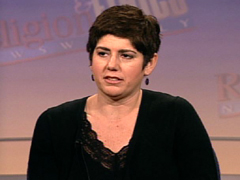 |
Ms. ZOLL: Right, and this is going to be a fascinating meeting also, which will be parsed in terms of its political significance. These are Baptists who either dislike the conservative direction of the Southern Baptist Convention or never had any ties directly to the Southern Baptist Convention before, and what they’re trying to do is come together on mission issues, public policy issues, to form kind of a counterweight to say there’s another way of being a Baptist in the United States. One of the challenges, though, is that it’s being organized by former President Carter, and attendees include former President Clinton and former Vice President Al Gore, along with Republicans, including Senator Charles Grassley and Senator Lindsay Graham. But cynics are looking at this and saying that this is a great stomping ground for the religious left. And there’s no presidential candidate going yet. Mike Huckabee had been invited, but there was such an outcry from the Southern Baptist leadership about it that he cancelled. He said he won’t come. But maybe with his new strength in the field he’ll decide this might be a good place for him.
ABERNETHY: E.J., I want to close with where we began. After all the talk about religion and campaigning, religion and governing, is there any consensus about where we stand on that?
Mr. DIONNE: I don’t think there’s a consensus being expressed in this campaign. I think there’s a slow consensus building in the country. I think there is a frustration in the country with kind of extreme politicization of religion, and religion only applying to a very, very narrow agenda. And I think, for example, there’s a kind of reformation, if you will, going on among evangelicals who are saying yes, we care about the right to life very much. We also care about AIDS in Africa. We also care about poor people in this country. So I think there’s an opening up of this discussion in what I, at least, think is a very healthy way.
ABERNETHY: Many thanks.
Mr. DIONNE: Thank you.
ABERNETHY: E.J. Dionne, Rachel Zoll, and David Gibson, Happy New Year to all of you.

